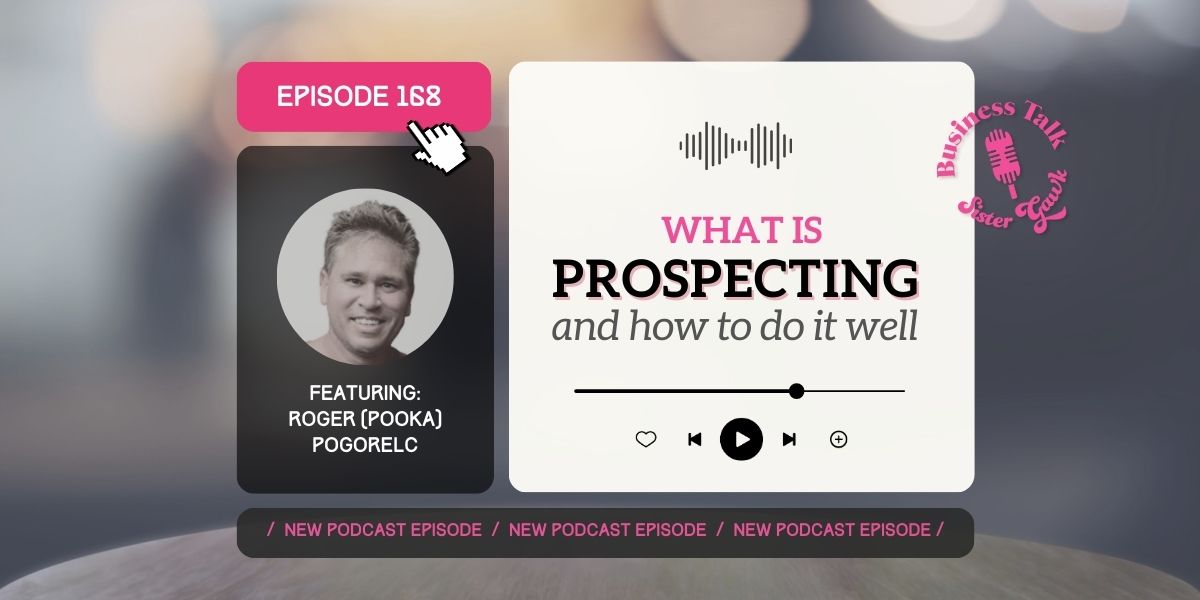Roger (Pooka) Pogorelc, serial entrepreneur, discusses the meaning of prospecting and how he recommends you practice improving these skills. He gives advice for talking on the phone, in-person, understanding the cues of your prospective customer, and knowing how to respond to questions or comments in a way that shows you are comfortable with receiving feedback.
Mastering the Art of Prospecting: Strategies and Insights
In this episode of Business Talk Sister Gawk, Bekkah dives into the essentials of prospecting with Roger Pooka, a seasoned sales expert. Roger shares his extensive experience in the field, offering valuable insights and strategies for effective prospecting.
Defining Prospecting
Early Beginnings in Sales
Roger Pooka embarked on his sales journey at the age of 21, when his family acquired an AMSOIL distributorship. AMSOIL specializes in motor oil, boat oil, and four-wheel oil products, akin to brands like Pennzoil and Mobil. Roger’s initial foray into sales involved face-to-face interactions and cold calling, which laid the foundation for his expertise in prospecting. Over the years, he expanded his repertoire to include selling advertisements for indoor and outdoor billboards, as well as his own podcast.
What is Prospecting?
According to Roger, prospecting is akin to grazing or sampling—it’s about exploring potential interest in a product or service. The goal is to uncover prospects who might be interested in what you’re offering. There are numerous methods to “touch” a prospect, ranging from digital marketing and emails to phone calls and face-to-face interactions. While traditional methods like mail still exist, modern prospecting also leverages instant messaging and other digital tools.
Developing a Prospecting Strategy
Passion and Natural Engagement
Roger emphasizes that if you’re passionate about what you’re selling, prospecting should come naturally. Your engagement with the product or service will guide you in identifying potential prospects. For instance, when Roger started his indoor advertising company, he looked for businesses already investing in advertising, such as those using outdoor billboards or radio ads.
Observational Skills and Networking
Effective prospecting also involves keen observational skills. Roger advises paying attention to conversations and environments where potential prospects might be present. Casual interactions, such as lunch conversations, can reveal valuable information about potential clients. Networking and leveraging existing relationships can also be a strategic way to get in front of key prospects.
Overcoming Discomfort in Sales
Personal Discomfort
Roger acknowledges that discomfort is an inevitable part of sales, especially in the beginning. Nervousness and sweaty palms are common, but persistence and experience help in overcoming these initial hurdles. Over time, familiarity with the process reduces anxiety and boosts confidence.
Making Prospects Comfortable
Avoiding “verbal vomit” is crucial to not overwhelming prospects. Roger advises against bombarding potential clients with excessive information. Instead, focus on a few key points that highlight the benefits of your product or service. Learning to pace your delivery and understanding the prospect’s comfort level are essential skills in making the interaction more pleasant for both parties.
In-Person vs. Phone Prospecting
In-Person Prospecting
One significant advantage of in-person prospecting is the ability to read body language. Roger recommends studying body language to better understand a prospect’s reactions. Building relationships through face-to-face interactions is particularly effective in small communities where repeat encounters are likely.
Phone Prospecting
When prospecting over the phone, maintaining the right cadence is vital. Roger advises against sounding too excited or rushed. Instead, adopt a calm and composed tone, and be concise to respect the prospect’s time. Effective phone prospecting involves balancing enthusiasm with professionalism.
Dealing with Rejection
Belief in the Product
Rejection is an inherent part of sales, but Roger stresses the importance of believing in your product or service. A strong conviction in the value of what you’re offering helps in maintaining motivation despite setbacks. Every rejection is an opportunity to learn and improve. Roger encourages viewing rejection as a stepping stone towards refining your approach and enhancing your skills.
Embracing the Challenges and Rewards of Sales
In the world of sales, persistence is key. Rejection is a constant companion, and every salesperson experiences it. The key to overcoming this lies in believing in your product or service. If you truly believe in its value, you will persevere through the tough times because you know the benefits it can bring to your clients. This conviction is what drives you forward, even when faced with repeated rejection.
Salespeople often encounter ruts where nothing seems to go right. It’s important to recognize that this is a normal part of the process. Whether you’re an athlete or a salesperson, everyone faces slumps. The important thing is to keep pushing forward. Eventually, you’ll break through and experience the highs of closing multiple deals in a row, feeling unstoppable.
Embracing the Fun in Sales
Sales should be enjoyable, especially in industries inherently linked to fun, like selling at a state fair. However, the fear of rejection often dampens this enjoyment, discouraging many potential salespeople. By focusing on the fun aspects and viewing rejection as a natural part of the process, you can maintain a positive outlook.
Gaining Experience and Polishing Your Skills
Experience is a critical factor in sales. As you encounter different scenarios, you develop polished responses and strategies. This experience helps in handling objections and uncomfortable situations with confidence, earning respect from prospects even if they ultimately decline your offer.
Leveraging Prospecting Tools
Always keeping your radar up is essential in sales. Whether it’s noticing new businesses, expansions, or hiring trends, staying aware of potential leads is crucial. Utilizing various resources such as newspapers, free publications, billboards, and even observing advertisements at events can provide valuable insights into potential clients.
Differentiating Between Business and Individual Sales
Prospecting businesses differ significantly from targeting individuals. Business prospects are often approached by salespeople regularly and may employ tactics to test your persistence and polish. On the other hand, individuals might rarely encounter sales pitches, requiring a different approach.
Tips for Individual Sales
While Roger primarily focused on business sales, he highlighted the importance of being comfortable and confident when approaching individual consumers. Knowing your product’s value and not being disheartened by rejection are crucial. Learning from other sales pitches can also be beneficial in understanding industry-specific tactics and customer expectations.
Tracking Your Connections
Keeping track of your contacts and conversations is vital. Roger shared his method of using a business card Rolodex and taking notes on the back of cards to remember key details about prospects. Even in the digital age, maintaining a notebook with detailed notes can help you stay organized and ensure timely follow-ups.
Embracing Experience and Wisdom
As you gain experience in sales, you’ll notice a shift in how prospects perceive you. With time, you’ll become the seasoned professional that younger prospects seek advice from. This shift brings confidence and respect, making your sales interactions more impactful.
Cold Calling: A Challenging but Necessary Task
Cold calling is one of the most challenging aspects of sales, but it is often necessary. The rejection rate is high, but it’s an essential part of building a client base. For those new to sales, it’s important to understand that cold calling gets easier with time and experience.
Interestingly, as you gain more experience and age, the dynamics of your interactions can change. When you’re young, prospects might not seek your advice as much. However, as you gain experience and grow older, younger professionals might start asking for your opinion, valuing your seasoned perspective.
For those in their thirties or forties, it’s important to hang in there. Eventually, the tables turn, and your experience becomes a valuable asset that prospects seek out. This shift can be incredibly rewarding and is a testament to the benefits of perseverance in the sales profession.
Finding Roger Pooka
Roger Pooka can be found on various social media platforms including Facebook, as GOAT Sports, in Instagram as Rogerpooka, and YouTube. He also hosts the “Tea with Miss McGill” podcast, which focuses on high school hockey in Northern Minnesota. Additionally, he participates in a racing podcast, contributing his expertise when time allows.
Roger and Bekkah’s conversation provided a wealth of insights into the world of sales, from handling rejection and staying motivated to leveraging experience and tracking connections. Embracing the fun in sales, continuously polishing your skills, and learning from others can significantly improve your sales success.
If you enjoyed this episode, please leave a review and stay tuned for more valuable insights on sales and other topics. You can also listen to Roger in Episode #157 sharing about How to Build an Indoor Billboard Advertising Company.


